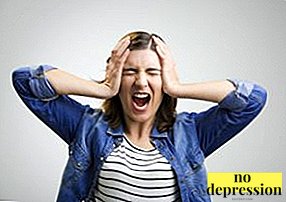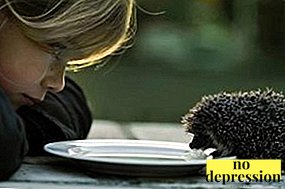Stress is a physiological condition that starts, when a person is influenced by stress factors: psycho-emotional upheaval, hunger, severe physical or mental overstrain, lack of sleep, prolonged illness and other effects, usually adverse.
Stress directs all the forces of the body to overcome difficulties. There are two types of stress: eustress and distress.
What is stress?

Stress - This is a body reaction that occurs in critical situations for a person.
This mechanism allows people to more effectively act in extremely difficult circumstances, make decisions faster.
It is a completely normal state for the human body, increasing the chances of survival and successful adaptation. But too often being under stress dangerous for the psyche and somatic health.
Throughout the existence of mankind, people constantly fell into stressful situations: they starved, suffered from wars, cold and heat, natural disasters, and diseases.
Now many of these causes for stress have faded into the background, but people continue to face it regularly: during excessive workloads, exams, deadlines, conflicts with relatives, crises in romantic relationships, travel, divorce.
Facts about stress:
- About him began to actively talk in the second half of the XX-th century, and he the term was coined by Walter Kenn, an American psychophysiologist, in 1929.
- Stress condition closely related to hormonal activity: during a situation that is critical for a person, adrenaline, cortisol and norepinephrine are thrown into the blood.
 They change the work of the organism so that it goes into a state of "hit or run," was ready to overcome difficulties by any means. In parallel, the performance of the gastrointestinal and immune systems is deteriorating.
They change the work of the organism so that it goes into a state of "hit or run," was ready to overcome difficulties by any means. In parallel, the performance of the gastrointestinal and immune systems is deteriorating. - The reasons for the stress state do not have to be purely negative: stress can occur in the process of the strongest positive experiences. In this case, the mechanism of stress and its consequences remain the same.
- It is important not to confuse stress with a nervous overstrain: stressful condition has a hard staging: first there is a state of panic, the body begins to produce cortisol, adrenaline and other hormones, after a period of resistance comes, when the hormones have worked as it should and a person is ready to deal with difficulties. Exhaustion follows at the end.
- With stress more often people living in metropolitan areas.
If a person is stressed too often, his mental and somatic health can be seriously shaken: the risk of developing many mental illnesses increases, especially depression, neurosis, anxiety disorders, obsessive-compulsive disorder, immunity is suppressed, cardiovascular, digestive and other systems deteriorate.
This is due to the effects of adrenaline and cortisol on the body.
Chronic stress - this is not the norm, but a condition that requires treatment.

Over 25% of people They are in chronic stress due to life difficulties, excessive workload, psycho-emotional shocks.
It is much more difficult for them than healthy people to be able to work, they hardly concentrate, they don’t get enough sleep, they remember information worse, they tend to feel insecure in their abilities, they get sick more often and longer.
Varieties
Stress has two types:
- Distress Negative form of stress, worsening the immune system of the body, undermining somatic and mental health. It is extremely difficult or impossible for a person to cope with this stressful condition, and he is often extremely strong and long-lasting. People who are under the influence of distress often suffer from infectious diseases and receive complications from them.
Too frequent distress increases the risk of developing mental and somatic diseases.
- Eustress. A mild form of stress, which acts on the body rather in a positive direction and helps to cope with feasible, uncritical difficulties. At the same time, frequent eustress can also affect the human body negatively, turning into distress, because it is linked to the production of cortisol and adrenaline. Also, eustress can be understood as stress caused by positive experiences.

Each person has a different level of stress resistance, dependent on many factors: type of nervous system, upbringing features, state of mental and somatic health, living conditions and much more.
What is the difference from distress?
Distress - This is a kind of stress, not something that is opposed to it. Any distress results from a stressful state.
The state of distress occurs when man is unable to cope with difficultiesappeared in his life, and with the effects of stress.
Normally, stress should not be frequent and excessively intense, it does not cause serious damage to the immune and other systems of the body and goes away on its own, often leaving memories that are pleasant to tell friends, invigorates, gives strength.
Distress is a pathological stress that manifests itself intensely, often persisting for a long time and damaging the body.
The problem of stress in labor

Requirements for workers and working conditions have always been high: workers had to cope with serious mental and physical stress, work regularly and a lot, actively contact with others, and sometimes risk their lives if work, for example, is associated with toxic substances.
But earlier, fifty-seventy years ago, almost never thought about the problem of stress. But now much more attention is being paid to quality of life, and the topic of stress has also become significant.
Main effects working distress:
- Somatic health problems. Employees have an increased risk of developing chronic diseases, so they will be forced to take more sick leave and become worse able to cope with duties.
The probability of sudden death, stroke, heart attack, especially among middle-aged and elderly workers will increase.
- Mental health disorders. Systematic distress leads to the development of depression, neurosis, and other mental disorders that significantly impair the employee's productivity and prevent him from being proactive, creative, and interested in what he does.
- Drop in productivity, deterioration of cognitive abilities, loss of desire to work. Workers suffering from chronic stress find it harder to concentrate, their thinking and memory function worse, which negatively affects their performance.

Distress in the workplace usually associated with conflicts, mobbing, excessive load, lack of opportunity to fully relax, uncomfortable environment, creating physical discomfort (cold, heat, lack of ability to meet basic needs), insufficient wages, which are often not appropriate to the efforts that the employee spends.
A competent and responsible employer understands perfectly well that light, infrequent, non-serious stress is usefulIt will help employees to better cope with their duties, increase their motivation, and distress, on the contrary, will decrease their efficiency.
Therefore, each of these employers seeks to ensure that workers feel distress as rarely as possible, are more productive, healthier and happier.
How to fight?
Key recommendations:
- Adjust the mode of the day. Properly compiled mode of the day will allow you to devote enough time to rest and sleep, will help you correctly distribute the load. Lack of sleep is a stress factor in itself, so it is important to sleep every day for at least 7-8 hours.
- Reduce the load, change the work if necessary. Try to give yourself enough rest in the course of your work, take small breaks between two and five to seven minutes long when you feel you need it. Often listen to your own well-being, learn to determine when you need to take time out. If your work requires excessive investments from you, you should think about finding a new one.
- Give more time to rest and hobbies. Favorite activities, sleep and walks help fight stress. Frequently listen to your favorite music, engage in physical activity, walk on foot in the fresh air, watch interesting films, series, cartoons, read books and articles, engage in creative hobbies: draw, write, dance.
- Do not postpone the task for later, work consistently. If you postpone too many tasks for later, the meeting with distress is inevitable.
- During periods of increased stress, take sedatives. This is especially important in those cases when you feel noticeable negative effects of distress: sleep disturbances, appetite, excessive irritability, inadequate emotional state drops, and headaches.
It is useful to consult with the doctor before taking the funds: he will tell you the most suitable, determine the dosage and duration of the course.
- Perform relaxing treatments. In the evenings, take a warm bath more often, add herbs or sea salt if you wish. Listen to beautiful, relaxing music.
- If you feel that the problems in your life are unsolvable, unbearable, consult a psychotherapist. Such a feeling can be a sign of depression, neurosis. Psychotherapeutic treatment and drug support will help you feel better, so the chances that you can cope with everything will increase.
- Avoid communicating with unpleasant people who make you uncomfortable. Conflict situations - one of the most common stress factors. If possible, break off contacts with those who regularly ruin your life.


Also important follow mental well-being.
If you feel overwhelmed or overwhelmed for more than two weeks, do not cope with your work and daily duties, you should contact a psychotherapist.
Do I need to get rid of eustress?
Eustress - This is the stress that does not harm the human body, so there is no need to exclude it from life. On the contrary, eustress adds fire to it, helps to cope with boredom, to feel happier.
In this case, the border between eustress and distress becomes very very thin.

It is important to capture the moment when this happens, and stop to give yourself the opportunity to fully relax.
Since eustress is also associated with the activity of cortisol and adrenaline, it should not be considered completely safe, and excessive amounts can have a negative impact on health, although not as serious as distress.
Positive and negative stress:

 They change the work of the organism so that it goes into a state of "hit or run," was ready to overcome difficulties by any means. In parallel, the performance of the gastrointestinal and immune systems is deteriorating.
They change the work of the organism so that it goes into a state of "hit or run," was ready to overcome difficulties by any means. In parallel, the performance of the gastrointestinal and immune systems is deteriorating.

